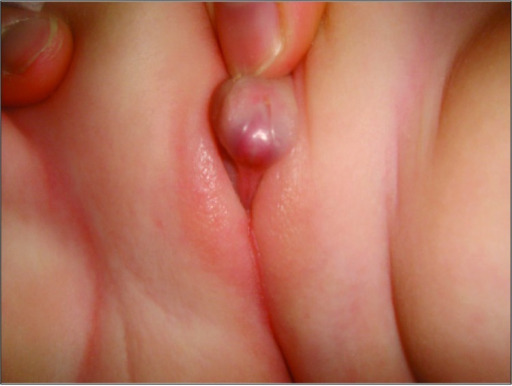Playlist
Show Playlist
Hide Playlist
Reproductive Case: 6-day-old Girl with Vomiting and Poor Feeding
-
Slides Reproductive Endocrine Disorders.pdf
-
Reference List Endocrinology.pdf
-
Reference List Reproductive Endocrine Disorders.pdf
-
Download Lecture Overview
00:01 Let's go on to another case A 6-day old newborn girl is brought to the hospital by a mother because of excessive vomiting and poor feeding. 00:10 The mother did not have any antenatal care. 00:13 Her temperature is 36.8 degrees celsius, her blood pressure is 50/30 mmHg and her pulse rate is 150 beats per minute. 00:23 On examination, the infant is dehydrated and demonstrates signs of shock The genitalia are ambiguous with a fused labia and an enlarged clitoris Lab results show a sodium of 125 mEq/L, a potassium of 6 mEq/L and a serum 17-hydroxyprogesterone level of 100,000 ng/dL What is the most likely cause of this infant's condition? Here we have a newborn who presents with vomiting and poor feeding. 00:58 There was no prenatal care and no evaluation of the mother during pregnancy She has a low blood pressure and evidence of shock. 01:07 The patient is dehydrated, she has abnormal genitalia but she also has hyponatremia. 01:13 A normal sodium level would be around 140 and here hers is 125 Coupled with the hypokalemia and the low blood pressure, we're thinking very strongly about an adrenal problem here causing her presentation. 01:29 Confirming this is the high level of 17-hydroxyprogesterone. 01:35 We perfom a ACTH stimulation test to confirm the diagnosis of congenital adrenal hyperplasia.
About the Lecture
The lecture Reproductive Case: 6-day-old Girl with Vomiting and Poor Feeding by Michael Lazarus, MD is from the course Reproductive Endocrine Disorders.
Included Quiz Questions
What is the most likely cause of the pathology described below? A 6-day-old newborn girl presents with excessive vomiting and poor feeding. Her mother did not have any antenatal care. Vital signs: Temperature of 36.8°C (98.2°F), blood pressure of 50/30 mm Hg, and pulse of 150 beats/min. Physical examination: Signs of dehydration and shock, ambiguous genitalia with fused labia and enlarged clitoris. Laboratory test results: Sodium level of 125 mEq/L, potassium level of 6 mEq/L, serum 17-hydroxyprogesterone level of 100,000 ng/dL (normal = 1,000–3,000 ng/dL).
- Congenital adrenal hyperplasia
- Ovotesticular disorder of sex development
- Androgen insensitivity syndrome
- Androgen-secreting tumor in the mother
What test is performed to confirm the diagnosis of congenital adrenal hyperplasia (CAH)?
- ACTH stimulation test
- Morning (8AM) cortisol test
- Basic metabolic panel
- 17-hydroxyprogesterone level
- CT of the abdomen/pelvis
Customer reviews
5,0 of 5 stars
| 5 Stars |
|
5 |
| 4 Stars |
|
0 |
| 3 Stars |
|
0 |
| 2 Stars |
|
0 |
| 1 Star |
|
0 |




